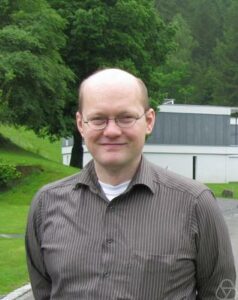Award of the Karl Georg Christian von Staudt Prize on April 22nd, 2022

The Karl Georg Christian von Staudt Prize is the highest endowed German prize for mathematics, with up to 25,000 euros, and is awarded by Friedrich-Alexander University of Erlangen-Nürnberg and the Otto and Edith Haupt Foundation.
On Friday, 22 April 2022, FAU will award the prize to Prof. Dr. Burkhard Wilking from the University of Münster for the construction of metrics with non-negative sectional curvature, the rigidity theorems for manifolds of positive curvature and, in particular, the creative use of the Ricci flow. The award ceremony will also be accompanied by the Staudt Colloquium with two speakers, Prof. Dr. Christian Bär (University of Potsdam) and Prof. Dr. Katrin Wendland (Trinity College Dublin).
The award events are open to the public and we look forward to a large attendance. The event will also be live-streamed at www.fau.tv/livestream.
Programme
10 – 12 am, University Assembly Hall:
Greeting by the Vice President of FAU, Prof. Dr. Georg Schett.
Laudatory speech: Prof. Dr. Ursula Hamenstädt (Bonn)
Award of the prize by the Vice President of the FAU, Prof. Dr. Georg Schett
Greeting by the President of the DMV, Prof. Dr. Ilka Agricola (Marburg)
12 – 2 pm, Orangery: Reception and snacks
2 – 4 pm, Assembly Hall of the University: Staudt Colloquium
Speaker: Prof. Dr. Christian Bär (University of Potsdam): “Positive Scalar Curvature on Manifolds with Boundary”.
Abstract:
„Which topologies can be shaped such that they get positively curved“ is a question which has been much investigated since the beginnings of global differential geometry. More precisely, we want to know which manifolds can be given a Riemannian metric with positive curvature. The answer depends very much on what exactly we mean be curvature. In this talk we will study the question for the weakest of these conditions, namely for scalar curvature. Starting from classical results we will see that the answer changes completely if we allow the manifold to have a nonempty boundary. There are quite a few natural boundary conditions which complement the positivity of curvature in the interior. We will see that many of them, but not all, are equivalent in a sense to be explained. The talk is based on joint work with Bernhard Hanke.
Speaker: Prof. Dr. Katrin Wendland (Trinity College Dublin): “Geometric properties of simple singularities”.
Abstract:
We consider isolated complex surface singularities which can be modelled as quotients of the complex plane by a finite subgroup of SU(2). In Riemannian geometry, these spaces may be viewed as orbifold limits of Ricci-flat Kähler spaces, which are flat away from the singular point. This talk will guide through some of the geometric properties of these spaces close to the singular point, combining tools from Riemannian geometry with the theory of modular forms.
If you would like to attend in person, please register on the Department of Mathematics website.
Further information:
Department of Mathematics
geschaeftsstelle@math.fau.de
